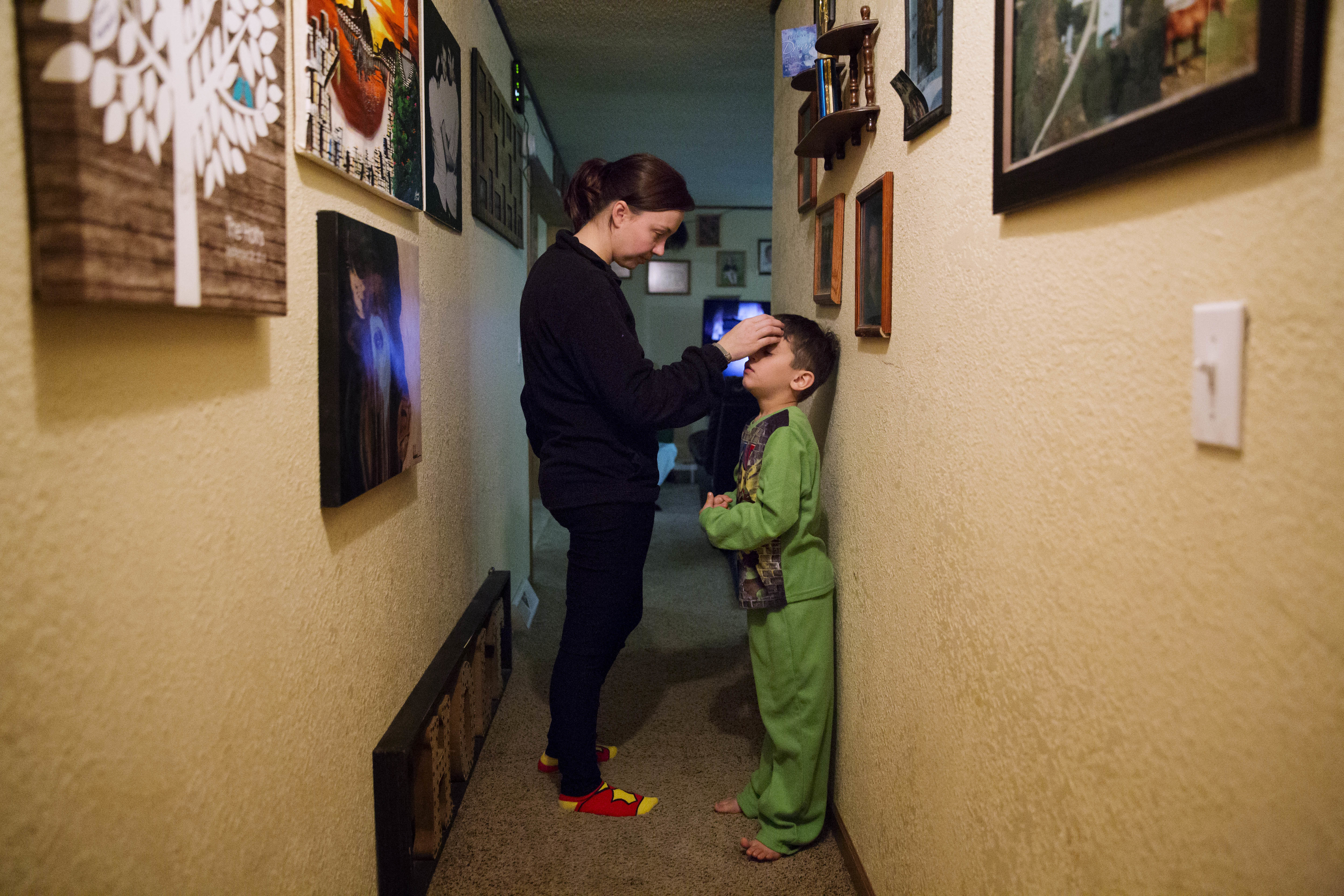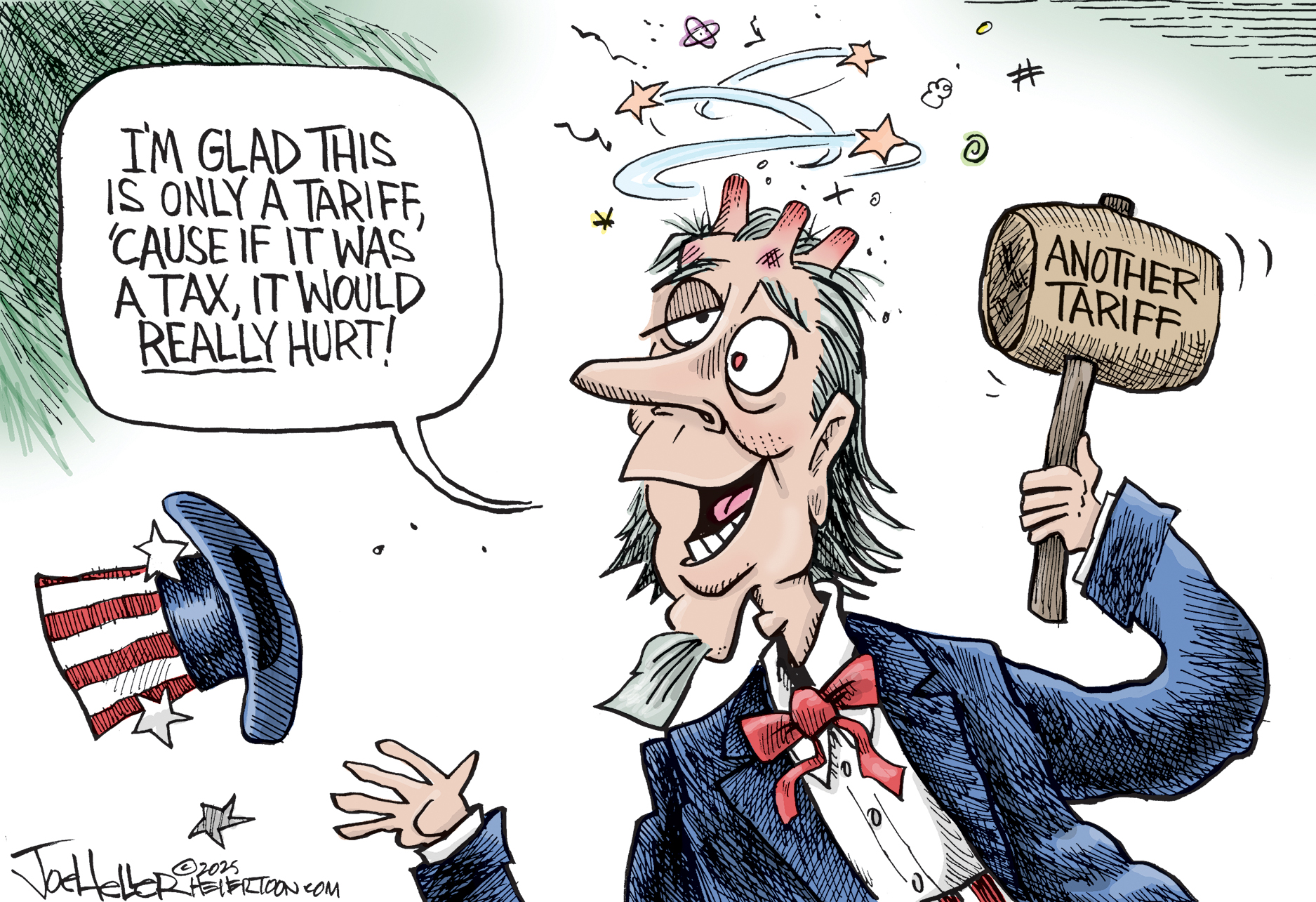Awaiting a revival in Trump country
Crawford County, Wisconsin, was one of the Democratic strongholds that helped give Donald Trump the White House. Now residents are waiting for the president's promised economic renaissance.

She tugged 13 envelopes from a cabinet above the stove, each one labeled with a different debt: the house payment, the student loans, the vacuum cleaner she bought on credit.
Lydia Holt and her husband tuck money into these envelopes with each paycheck to whittle away at what they owe. They both earn about $10 an hour, and with two kids, there are usually some they can't fill. She did the math; at this rate, they'll be paying these same bills for 87 years.
In 2012, Holt voted for Barack Obama because he promised her change, but she feels that change hasn't reached her here, in Prairie du Chien, Wisconsin. So last year she chose a presidential candidate unlike any she'd ever seen, the billionaire businessman who promised to help America, and people like her, win again.
Subscribe to The Week
Escape your echo chamber. Get the facts behind the news, plus analysis from multiple perspectives.

Sign up for The Week's Free Newsletters
From our morning news briefing to a weekly Good News Newsletter, get the best of The Week delivered directly to your inbox.
From our morning news briefing to a weekly Good News Newsletter, get the best of The Week delivered directly to your inbox.
Many of her neighbors did, too — so many that for the first time in more than 30 years, Crawford County, a sturdy brick in the once mighty Big Blue Wall, abandoned the Democratic Party, and that wall crumbled. The rural county lent Donald Trump 3,844 votes toward his win. More came from formerly blue counties to the north and to the south, and on and on. Some 50 counties stretching 300 miles down the Mississippi River — through Minnesota, Wisconsin, Iowa, and Illinois — transformed in one election season into Trump country.
They voted for Trump for an array of reasons, and the list of grievances they hope he now corrects is long and exacting: stagnant wages, the cost of health care, a hard-to-define feeling that things are not getting better, at least not for people like them.
Here in Prairie du Chien, residents often recite two facts about their hometown, the first one proudly: It is the second-oldest community in the state. The next is that it's also one of the poorest.
There are no rusted-out factories to embody this discontent. The main street of Prairie du Chien butts up against the Mississippi River and bustles with tourists come summer. Pickup trucks crowd parking lots at the 3M plant and Cabela's distribution center, where hundreds work. Just a few vacant storefronts hint at the seething resentment that life still seems harder here than it should be.
A free daily email with the biggest news stories of the day – and the best features from TheWeek.com
In this place that astonished America when it helped hand Trump the White House, many of those who chose him greeted the frenetic opening acts of his presidency with a shrug. Immigration is not their top concern, and so they watched with some trepidation as Trump signed orders to build a wall on the Mexican border and bar immigrants from seven Muslim countries, sowing chaos around the world.
Among them is a woman who works for $10.50 an hour in a sewing factory, who still admires Obama, bristles at Trump's bluster, but can't afford health insurance. And the dairy farmer who thinks Trump is a jerk — "somebody needs to get some Gorilla Glue and glue his lips shut" — but has watched his profits plummet and was willing to take the risk.
There's a man who owns an engine repair shop and struggles to keep the lights on, and a bartender who cringes when he sees "Made in China" printed on American goods.
There's also Holt, who makes $400 a week as a lawyer's assistant and whose husband doesn't do much better at a car parts store. She is enthusiastic that Trump started quickly doing the things he said he would, because she worries that by the time their sons grow up there will be nothing left for them here.
In this corner of Middle America, in this one, small slice of the nation that sent Trump to Washington, they are watching and they are waiting, their hopes pinned on his promised economic renaissance. And if four years from now the change he pledged hasn't found them here, the people of Crawford County say, they might change again to someone else.
Katherine Cramer, a political science professor at the University of Wisconsin–Madison, coined a name for what's happened in her state's rural pockets: the politics of resentment.
She spent years traveling to small towns and talking to people at diners and gas stations. And when she asked which political party best represented them, their answers almost always sounded something like, "Are you crazy, lady? Neither party is representing people around here."
"People have been looking for a politician who is going to change that, going to listen to them, do it differently," she said. "People a lot of times don't have specifics about what that means. They just know that however government is operating currently is not working for them."
In Crawford County, with just 16,000 residents, that dissatisfaction stems from feeling left behind as other places prosper. There are plenty of jobs in retail or on factory floors, but it's hard to find one that pays more than $12 an hour. Ambitious young people leave and don't come back. Rural schools are dwindling, and with them a sense of pride and purpose.
Still, much of the economic anxiety is based not on measurable decay, but rather on a perception that life is decaying, said Jim Bowman, director of the county's Economic Development Corporation.
There are higher-paying jobs — in welding, for example — but companies can't find enough workers with the right training, Bowman said. The county's $44,000-a-year median household income is $9,000 less than the state's, but the cost of living is lower, too.
Just 15 percent of adults have college degrees, half the national average, and yet the ratio of people living in poverty is below that of the country as a whole.
Yet for many here, it doesn't feel that way. "If you ask anybody here, we'll all tell you the same thing: We're tired of living like this. We've been railroaded, run over by the politicians and run over by laws," said Mark Berns, leaning through the service window in the small-engine repair shop downtown that he can barely keep open anymore. He drives a 14-year-old truck with 207,000 miles on it because he doesn't make enough profit to buy a new one.
Berns watched Trump's first days in office half hopeful, half frightened. "He jumps on every bandwagon there is. It's a mess," he said, bemoaning what he described as a quantity-over-quality, "sign, sign, sign" approach to governing. "I just hope we get the jobs back and the economy on its feet, so everybody can get a decent job and make a decent living, and have that chance at the American dream that's gone away over the past eight or 10 years."
Marlene Kramer gets to work before the sun comes up and spends her days sitting at a sewing machine, stitching sports uniforms for $10.50 an hour.
Kramer, who voted twice for Obama, used to watch Trump on Celebrity Apprentice. "I said to myself, 'Ugh, I can't stand him.'" When he announced his candidacy, she thought it was a joke. "Then my husband said to me, 'Just think, everything he touches seems to turn to money.'" And she changed her mind.
She's 54, and she's worked since she was 14, all hard jobs: feeding cows, pulling weeds, standing all day on factory floors. Now it's the sewing shop, where she's happy and gets to sit. But there's no health insurance.
Her bosses, brothers Todd and Scott Yeomans, opened the factory 12 years ago. They said they're trying to do the right thing by making sportswear with American-made fabrics and American labor. But they compete against factories overseas.
They'd like to offer insurance. The other day, a trusted worker quit for a job with benefits. But they've run the numbers and it would cost $200,000 a year — far more than they can spend.
Kramer said she's glad the Affordable Care Act has helped millions get insurance, but it hasn't helped her. She and her husband were stunned to find premiums over $1,000 a month. Her daughter recently moved into their house with her five children, so there's no money to spare. They opted to pay the penalty of $2,000, and pray they don't get sick until Trump, she hopes, keeps his promise to replace the law with something better.
Some rural Wisconsin Democrats also think their party's leaders are among those who stopped paying attention to those just trying to get by. On the same day that Trump took the oath of office, a group of them huddled in the back room of a tavern, still trying to grasp how the election went awry.
Bob Welsh met Hillary Clinton at a rope line in Iowa and asked her to visit Wisconsin. But she didn't come a single time during her campaign against Trump, and Welsh thinks that confirmed in the minds of many that Democrats are uninterested in white working people.
Welsh wears flannel shirts and suspenders. He grew up on a farm, worked as a herdsman, and drove a school bus until he was 76 years old. He's 78 now, and knows his neighbors as kind, hardworking people, and could barely believe they voted for a man he finds reprehensible. But the left-right, blue-red vitriol that has cleaved the country has not left the same scars here, where wives reported not knowing how their own husbands voted and husbands said they never asked their wives.
Welsh said he hopes Trump finds a way to keep his promise to build his friends better lives. "If he does that then he'll change my mind," he said. "And I'll be the first to admit it."
Bernard Moravits hosed the mud and cow dung off the boots pulled up over his jeans and headed for his truck, to drive to town to talk to a banker about keeping his farm afloat.
Moravits — everyone calls him Tinker — works on his farm outside of town at least 12 hours every day, and usually a lot longer. He diversified to minimize risk and has dairy and beef cattle, and acre after acre of corn, beans, alfalfa. The price of milk and agricultural goods has plummeted, and it's hard to keep things running.
Change is what he looked to Obama for and now expects from Trump. He wants the president to reduce red tape and renegotiate trade deals to benefit American farmers. And he hopes people make more money and spend more money, which eventually trickles down to him.
"I think he's a shrewd businessman," he said. "He's been broke several times. He keeps bouncing back, and he knows how big business works."
He has several choice words for Trump's move to build "his stupid wall." Moravits employs Hispanic workers who have been with him 15 years. He built them apartments. He trusts them to do a dirty, difficult job that he says white people aren't willing to do. "A lot of people don't treat them like people," he grumbled.
Unlike many transfixed by Trump's presidency, Moravits doesn't stay up-to-the-minute on the news. In the morning, he checks the agriculture prices and the weather. As protests over Trump's immigration ban raged, Moravits wasn't paying attention.
He took over this farm at 18 years old, when his father died of an aneurysm while milking cows. He plans to die here, too. He'll retire when "they close the casket lid."
But if nothing changes and changes soon he might have to borrow against his equity.
Moravits isn't sure Trump is going to "Make America Great Again" for farmers. But he feels he had to take the gamble.
"He might have us in a war in two weeks," he said. "We'll come back here in six months, drink a 30-pack of Busch Light and talk, because no one knows now what's gonna happen." He laughed, then shrugged, and pantomimed rolling the dice.
Excerpted from an article that was originally published by the Associated Press. Reprinted with permission.
-
 August 2 editorial cartoons
August 2 editorial cartoonsCartoons Saturday’s political cartoons include a tariff self-own, rough times at the Trump golf course, and more
-
 5 inexcusably hilarious cartoons about Ghislaine Maxwell angling for a pardon
5 inexcusably hilarious cartoons about Ghislaine Maxwell angling for a pardonCartoons Artists take on the circle of life, Ghislaine's Island, and more
-
 Ozzy Osbourne obituary: heavy metal wildman and lovable reality TV dad
Ozzy Osbourne obituary: heavy metal wildman and lovable reality TV dadIn the Spotlight For Osbourne, metal was 'not the music of hell but rather the music of Earth, not a fantasy but a survival guide'
-
 Ghislaine Maxwell: angling for a Trump pardon
Ghislaine Maxwell: angling for a Trump pardonTalking Point Convicted sex trafficker's testimony could shed new light on president's links to Jeffrey Epstein
-
 The last words and final moments of 40 presidents
The last words and final moments of 40 presidentsThe Explainer Some are eloquent quotes worthy of the holders of the highest office in the nation, and others... aren't
-
 The JFK files: the truth at last?
The JFK files: the truth at last?In The Spotlight More than 64,000 previously classified documents relating the 1963 assassination of John F. Kennedy have been released by the Trump administration
-
 'Seriously, not literally': how should the world take Donald Trump?
'Seriously, not literally': how should the world take Donald Trump?Today's big question White House rhetoric and reality look likely to become increasingly blurred
-
 Will Trump's 'madman' strategy pay off?
Will Trump's 'madman' strategy pay off?Today's Big Question Incoming US president likes to seem unpredictable but, this time round, world leaders could be wise to his playbook
-
 Democrats vs. Republicans: which party are the billionaires backing?
Democrats vs. Republicans: which party are the billionaires backing?The Explainer Younger tech titans join 'boys' club throwing money and support' behind President Trump, while older plutocrats quietly rebuke new administration
-
 US election: where things stand with one week to go
US election: where things stand with one week to goThe Explainer Harris' lead in the polls has been narrowing in Trump's favour, but her campaign remains 'cautiously optimistic'
-
 Is Trump okay?
Is Trump okay?Today's Big Question Former president's mental fitness and alleged cognitive decline firmly back in the spotlight after 'bizarre' town hall event